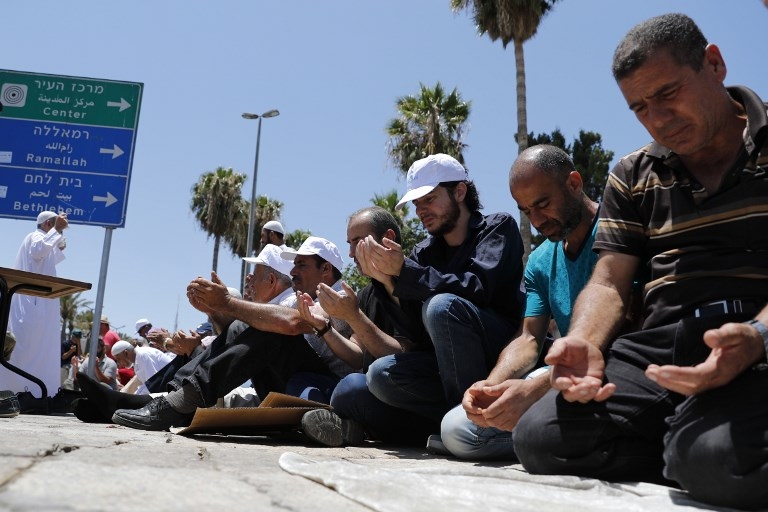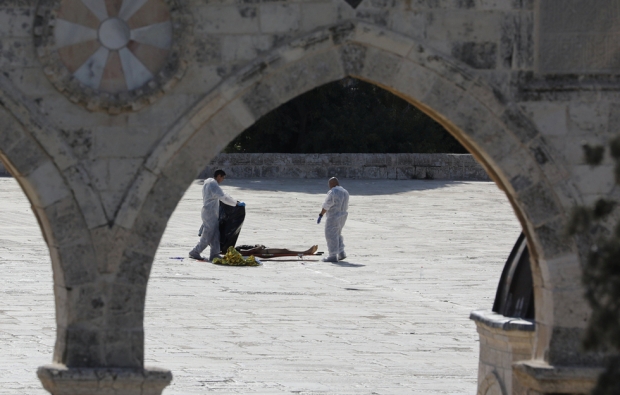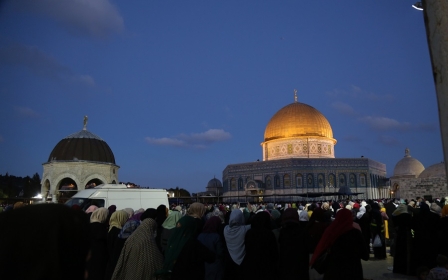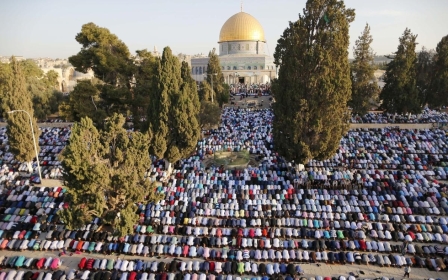Jerusalem grand mufti detained after holy site attack leaves five dead

The grand mufti of Jerusalem was detained by Israeli security forces on Friday after three attackers opened fire on Israeli police in Jerusalem's Old City, killing two.
The attackers fled to a nearby highly sensitive holy site before being killed by security forces, police said.
The three attackers were killed at the site known to Muslims as the Haram al-Sharif and to Jews as the Temple Mount, the location of regular clashes between Palestinians and Israeli police, but gunfire rarely occurs there.
Luba Simri, an Israeli police spokeswoman, said: "When they saw policemen they shot towards them and then escaped towards one of the mosques in the Temple Mount compound.
"A chase ensued and the three terrorists were killed by police."
She said three firearms were found on their bodies. Two of the injured Israeli police later died of their injuries.
Police said Friday prayers for Muslims would not be held at the site following the attack.
The office of the grand mufti, Muhammad Ahmad Hussein, confirmed to BBC Arabic that he had been detained by the Israelis after criticising the closure of the complex.
He had been leading prayers near the Damascus Gate as Palestinians could not access the al-Aqsa mosque.
Before his arrest the grand mufti, the city's highest Islamic authority, condemned the closure of the mosque compound for prayers.
"I have very little information about it, but it doesn't mean you should close the mosque for prayers," he told journalists at the Lion's Gate entrance to the Old City, near the holy site.
"There is no reason to close the mosque for Friday prayers."
He was released later on Friday.
Mobile phone video footage aired by Israeli media showed several policemen chasing a man and shooting him down at the site, which is a popular place for foreign tourists to visit. Israeli authorities are still working to identify the attackers, police spokesman Micky Rosenfeld said.
The Palestinian president, Mahmoud Abbas, spoke to Israeli Prime Minister Benjamin Netanyahu by phone on Friday and condemned the shooting, Palestinian news agency Wafa said.
"The president expressed his strong rejection and condemnation of the incident that took place at al-Aqsa Mosque, as well as his rejection of any violent incidents from any side, especially in places of worship," Wafa said.
No group claimed responsibility, though Hamas, which rules the Gaza Strip, praised the attack.
"Hamas lauds the heroic operation in Jerusalem," Hamas spokesman Abdel-Latif al-Qanoua said in a statement.
Jordan on Friday urged Israel to "immediately reopen" the Al-Aqsa mosque compound.
Jordan is the custodian of the compound in Israeli-annexed east Jerusalem, and has repeatedly denounced what it says are violations of rules at Islam's third holiest site.
"Israel must reopen Al-Aqsa mosque and the Haram al-Sharif (compound) immediately," said government spokesman Mohamed Momani, who is also information minister.
He added in a statement carried by the official Petra news agency that Israel must "refrain from taking any step aimed at changing the historical" status quo of Jerusalem or the Al-Aqsa mosque compound.
Tensions are often high around the marble-and-stone compound that houses al-Aqsa mosque and the golden Dome of the Rock. It is managed by Jordanian authorities and is adjacent to the Western Wall, the holiest site where Jews are permitted to pray.
A Palestinian was also killed during clashes with Israeli forces at a refugee camp near the city of Bethlehem in the occupied West Bank.
The Palestinian health ministry identified the man killed as Bara Hamamdah, 18, and said he had been shot in the chest during the clashes in Dheisheh.
Israel's military confirmed the clashes but not the death, saying soldiers were there as part of an operation to arrest suspects.
Security procedure at site to be re-evaluated
Netanyahu met with security officials and said checks were continuing in the area to ensure there were no other assailants, a statement from his office said.
Israeli public security minister Gilad Erdan called it an "extremely severe event which crossed all red lines".
"The investigation is ongoing," he said.
"We will need to re-evaluate all of the security arrangements on the Temple Mount and its environs. I call on leaders on every side to work to calm the situation and maintain the quiet in Jerusalem."
It is not the first time the grand mufti has been arrested by the Israelis. In May 2013 he was detained and questioned after being accused of encouraging disturbances at religious sites in the city. He was released after six hours.
A wave of Palestinian street attacks that began in 2015 has slowed but not stopped. At least 255 Palestinians and one Jordanian citizen have been killed since the violence began.
Israel says at least 173 of those killed were carrying out attacks while others died in clashes and protests. Thirty-eight Israelis, two US tourists and a British student have been killed in stabbings, shootings and car-rammings.
Israel annexed East Jerusalem, where the Old City and the holy compound are located, after the 1967 Middle East war and regards all of Jerusalem as its capital, a move that is not recognised internationally.
Palestinians want East Jerusalem as the capital of the state they want to establish in the West Bank and Gaza Strip.
Israel blames the wave of violence on incitement by the Palestinian leadership. The Palestinian Authority, which exercises limited self-rule in the West Bank, says desperation over the occupation is the main driver.
The last, US-led attempt to broker peace between the Israelis and Palestinians broke down in 2014.
Middle East Eye propose une couverture et une analyse indépendantes et incomparables du Moyen-Orient, de l’Afrique du Nord et d’autres régions du monde. Pour en savoir plus sur la reprise de ce contenu et les frais qui s’appliquent, veuillez remplir ce formulaire [en anglais]. Pour en savoir plus sur MEE, cliquez ici [en anglais].






